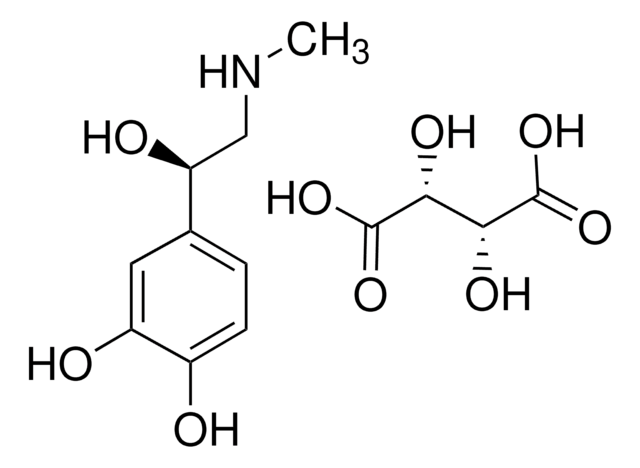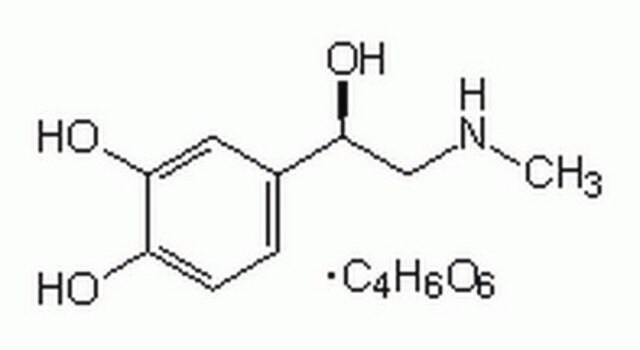E4375
(−)-Epinephrine (+)-bitartrate salt
solid, adrenergic receptor agonist
Synonym(s):
L-3,4-Dihydroxy-α-(methylaminomethyl)benzyl alcohol D-hydrogen bitartrate salt, L-Adrenaline (+)-bitartrate salt, L-Adrenaline D-hydrogentartrate, L-Epinephrine D-hydrogentartrate
About This Item
Recommended Products
product name
(−)-Epinephrine (+)-bitartrate salt, solid
form
solid
Quality Level
color
white
solubility
H2O: soluble
alcohol: soluble
storage temp.
2-8°C
SMILES string
O[C@H]([C@@H](O)C(O)=O)C(O)=O.CNC[C@H](O)c1ccc(O)c(O)c1
InChI
1S/C9H13NO3.C4H6O6/c1-10-5-9(13)6-2-3-7(11)8(12)4-6;5-1(3(7)8)2(6)4(9)10/h2-4,9-13H,5H2,1H3;1-2,5-6H,(H,7,8)(H,9,10)/t9-;1-,2-/m01/s1
InChI key
YLXIPWWIOISBDD-NDAAPVSOSA-N
Gene Information
human ... ADRA1A(148) , ADRA1B(147) , ADRA1D(146) , ADRA2A(150) , ADRA2B(151) , ADRA2C(152) , ADRB1(153) , ADRB2(154) , ADRB3(155)
Looking for similar products? Visit Product Comparison Guide
General description
Application
- to test the possible existence of β-adrenergic vasodilation
- to infuse into the adipose region to minimize blood loss and tissue contamination
- as a platelet agonist in the preparation of optimal platelet aggregometry 96-well plates
- in the measurement of total superoxide dismutase (tSOD) enzymatic activity
Biochem/physiol Actions
Features and Benefits
Caution
Signal Word
Danger
Hazard Statements
Precautionary Statements
Hazard Classifications
Acute Tox. 1 Oral
Storage Class Code
6.1A - Combustible acute toxic Cat. 1 and 2 / very toxic hazardous materials
WGK
WGK 3
Flash Point(F)
Not applicable
Flash Point(C)
Not applicable
Personal Protective Equipment
Certificates of Analysis (COA)
Search for Certificates of Analysis (COA) by entering the products Lot/Batch Number. Lot and Batch Numbers can be found on a product’s label following the words ‘Lot’ or ‘Batch’.
Already Own This Product?
Find documentation for the products that you have recently purchased in the Document Library.
Customers Also Viewed
Our team of scientists has experience in all areas of research including Life Science, Material Science, Chemical Synthesis, Chromatography, Analytical and many others.
Contact Technical Service








